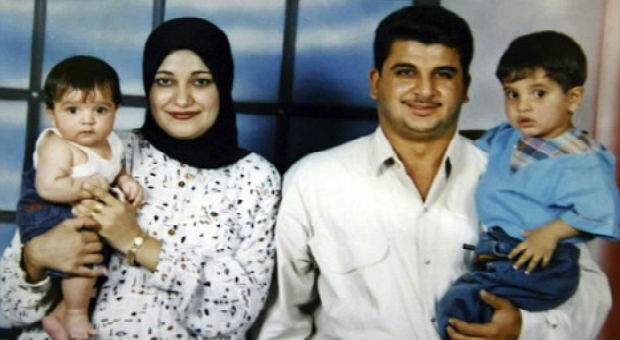Iraq – What was done in our name? Comment
Ideas, New in Ceasefire, Politics - Posted on Friday, January 13, 2012 13:49 - 2 Comments
By Phil Shiner
Baha Mousa, 26, with his wife and two children. He was detained by the British army for 36 hours and died on 15 September 2003 (Photograph: Reuters)
Two million people marched in London against an invasion of Iraq on 15 February 2003. I doubt if any of the protesters could have imagined in their wildest dreams the serious human rights violations about to be committed by UK Armed Forces and intelligence personnel in our name. Our worst nightmares might have included the use of cluster munitions causing indiscriminate deaths of Iraqi civilians, or disproportionate bombardments of civilian areas, or even the use of depleted uranium, but not what actually happened.
The UK’s detention and interrogation policies in Iraq were not only completely unlawful but outrageously contaminated by the fact that our co-author in this illegal war, soon to become our Joint Co-Occupier subsequently, was the United States. Everything the world community associates with US practices and techniques, whether at Guantanamo Bay, Bagram Air Base, Abu Ghraib, secret sites or rendition is of a piece with UK policies and practices in Iraq. This is not my subjective opinion or idle speculation. It is a matter of publicly available evidence.
What are the building blocks of this assertion? First, the reader should access the publicly available report of Sir William Gage into the death of Baha Mousa. He records that the MoD had no grip on its own interrogation policies; that unlawful coercive interrogation techniques were being taught to UK Tactical Questioners and interrogators before the invasion and during the UK occupation of SE Iraq; that the five banned techniques from internment in Northern Ireland (hooding, stress positions, sleep deprivation, food and water deprivation, and the use of noise) returned as Standard Operating Procedure.
He notes that as early as 20 May 2003 UK battle groups had killed a number of Iraqi civilians in custody (the number turns out to be eight). He makes 73 wide-ranging recommendations: no more hooding, “harshing”, and training of coercive techniques and many, many more.
Second, the reader needs to consider the relative narrowness of the Gage Inquiry Terms of reference. Sir William could only look at the context of Baha Mousa’s killing. He could not explore the UK’s relationship with the US, or the practices in theatre of the interrogators in the Joint Forward Interrogation Team.
Next, it is crucially important to explore the context of the recent Court of Appeal judgment in the case of R (Ali Zaki Mousa and others) v Secretary of State for Defence, 22 November 2011. This case concerns 129 Iraqi civilians complaining that their loved ones had been killed whilst in detention by UK Forces, or that they are victims of torture and ill-treatment at their hands.
The MoD’s case was that it was legally sufficient for it to investigate all these cases through its establishment of the Iraq Historic Allegations Team (IHAT). The Court of Appeal has ruled that IHAT is not independent, as it must be, and the Secretary of State for Defence now has to consider whether he can further delay the establishment of a fully independent and public inquiry into the UK’s detention policy in SE Iraq.
The detail of the allegations made by the victims in these cases makes for deeply unpleasant and shocking reading and includes:
• The use of sexual techniques specifically designed to humiliate and debase male Muslims including forced simulated oral and anal sex, the playing of hardcore pornography all night during Ramadan, soldiers having sex in front of Iraqis, female interrogators shoving their genitals and breasts into the faces of detainees, masturbation over Iraqis and so on.
• Threats, deaths threats, threats to rape wives, mock executions and similar.
• Prolonged solitary confinement, sleep deprivation, other techniques designed to disorientate, temperature manipulation, the playing of music all night and other techniques designed to ensure that Iraqis held in incommunicado detention had no idea whether it was night or day, or what to expect next.
When these allegations first began to surface in 2004, the MoD fell back on the familiar “few bad apples” thesis. That has long fallen by the wayside. Then it assured us that it had investigated through The Aitken Report and that all was well. That argument also fell into disuse years ago.
Next they said that IHAT will do the job. The Court of Appeal now says that is not good enough. It remains to be seen what its next move will be. To date, the MoD as a corporate entity has consistently plumbed the depths of what can be dreamt up as dirty tricks and tactics to keep its detention and interrogation policies from public view. The recent convictions of two of the murderers of Stephen Lawrence gives my team hope that in some circumstances, if teams of lawyers keep at it, justice might in the end prevail.
2 Comments
Iraq – What was done in our name? « Peace and Justice Post
Bob
Really impressed with your work since the beginning of this war on helping to hold accountable the perpetrators of such horrendous actions. A spotlight needs to continue to be shed on these issues, I was impressed to see you in John Pilgers documentary ‘The war you don’t see” doing exactly that.




[…] Shiner, Ceasefire Magazine, Jan 13, […]